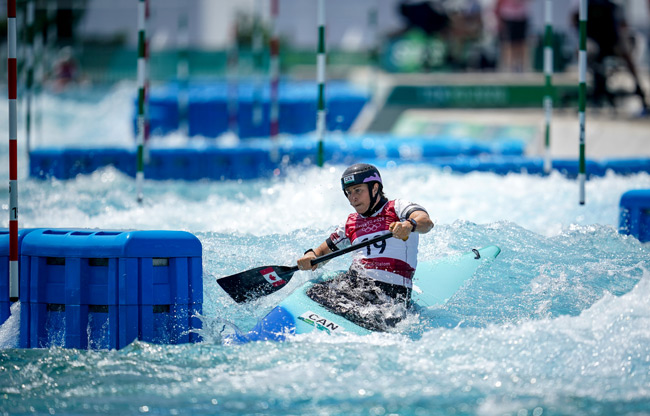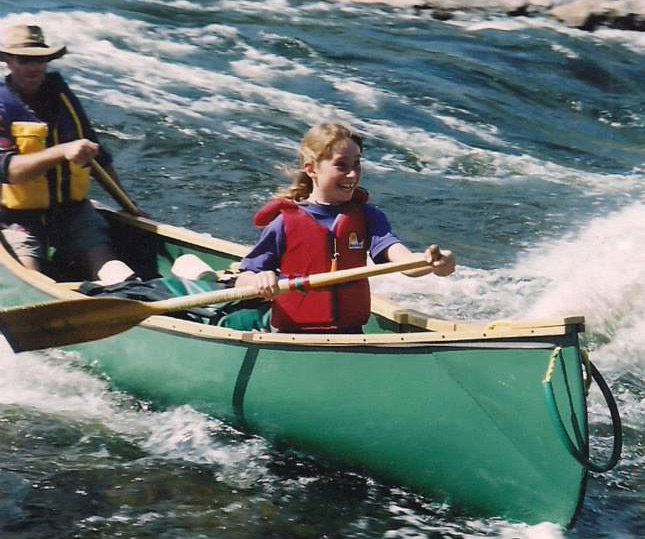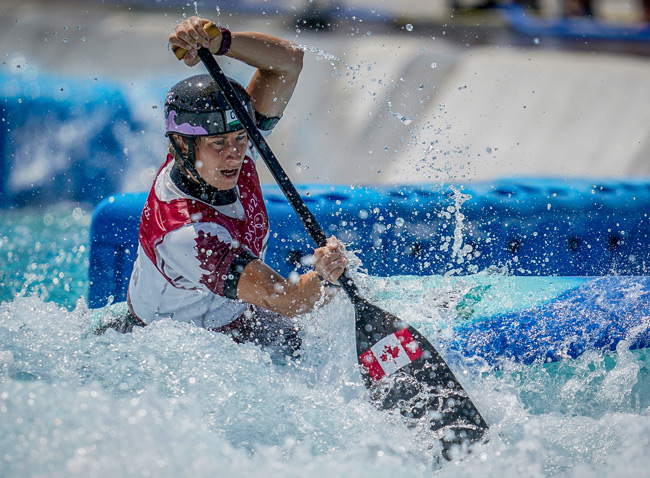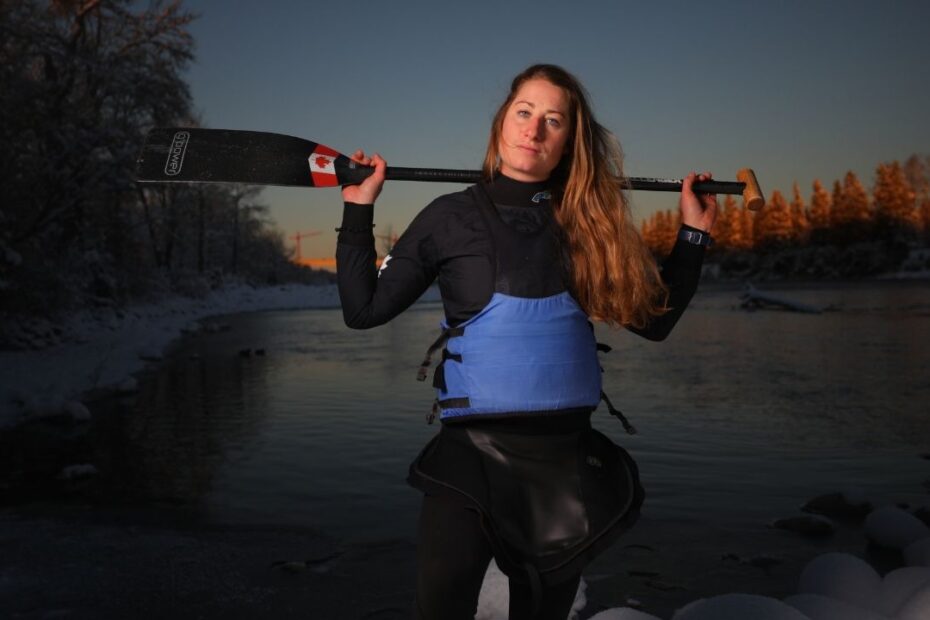Photos courtesy of Haley Daniels, Leah Hennel/Canadian Olympic Committee.
Patiently waiting her turn to practise, boat bobbing in a quiet eddy at the top of the Kasai Canoe Slalom Centre’s course, she reaches over to the river’s side to still herself.
When Haley Daniels takes a peek, it hits her.
Like a paddle.
“My hand was on the Olympic rings.”
And, with a gasp, she yanks her right hand away from the signage. For Daniels, it’s nearly too much to comprehend.
The sentiment, for those familiar with the Calgarian’s background, is wholly understandable. Because this is someone who has devoted her adult life to the cause.
For women canoeists to be permitted to race at the Summer Games.
So on that day, two weeks prior to the historic appearance in Tokyo, when the Olympic symbol finally became reality — tangible reality — it is striking. That she is able to literally grab hold of her dream, that it is real, is mind-blowing.
“Because for so long it was almost untouchable,” said Daniels. “It was almost out of reach for me because we weren’t allowed to go.
“It was very surreal being in that moment of actually touching the Olympic rings and being there and in it.”
All this emotional momentum — and she has yet to make her actual debut.
Later when she does line up for the first run in the women’s canoe slalom, Daniels allows herself a moment. And she smiles.
“Because I knew that in 30 seconds I was going to be the fourth woman in women’s canoeing to ever cross the start line. That was pretty cool,” she said. “I remember feeling this sense of relief because we did it. No matter what happens, we are officially in the Olympics. We’re making history. That really resonated with me. I felt it. I felt chills in my body.”
Australia’s Jessica Fox caps the remarkable chapter by winning gold. “We were all bawling. It was such a magical moment.”
A dozen years ago when Daniels fell in love with the sport, she had no idea that she was about to be immersed in a battle for gender equality. But she willingly embraced the struggle.
So witnessing the triumph was powerful stuff.
“I had been fighting for so long … I cried every day I was at the Olympics,” said Daniels. “There were moments of joy, of being overwhelmed, just knowing that my hard work got me there.”
Indeed, commitment to her demanding sport — and lobbying for its inclusion — consumed a large chunk of Daniels’ waking hours. Which may explain why, upon her return from Tokyo, she was spent.
Landing in Calgary signified the end of an eight-month stretch on the road. Yet being home was difficult, Daniels says, and she experienced “a big low dip,” which kind of surprised her.
“But, you know, you’re on a high for so long — I’ve had a singular goal for 12 years,” she said. “Tokyo has been my goal for a very long time. Not to say Paris isn’t my goal — Paris is definitely in my sights now — but I have a different relationship with it because I didn’t fight for it, I didn’t establish it.”

Because Daniels had been away for so long, she plunged head-first into an active lifestyle when she got back into familiar surroundings.
She admits to having a case of FOMO — fear of missing out. So after a brief breather she got busy. Mountain-biking. Hiking. “I went really hard for two months.”
Into that wave of busy-ness, she began to incorporate formal workouts, which is her com-fort zone. “I have a guilt associated with that — if I’m not training, I’m like, ‘What am I doing?'”
At some point, reality came crashing down on top of Daniels, who, physically and mental-ly and emotionally, was frazzled. “Completely wiped out,” is how she describes it.
Finally — and currently — she is taking a break. Even if she can’t help herself, mixing in a little downhill skiing.
Predictably, for a high-revving person like Daniels, down time doesn’t look particularly restful.
She’s shouldering two part-time jobs — community investment and sponsorships for RBC; communications for the Alberta Whitewater Association — while working through an online degree from Royal Roads University. On this day, she’s tackling a 10-page paper on Brazil and global trade. She graduates in August.
There is never much time to relax.
A cross-country skiing camp for the Canadian canoeists is slated for Canmore in a couple of weeks. Then, some time in March, she will catch up with the national team in France.
In other words, the grind resumes — with Paris 2024 in the distance.
“I’m definitely still trying to figure out how to get through another Olympic cycle,” said Daniels, “because it’s so much to wrap my head around.”
Not that she plans to halt her adventure. Daniels remembers seeing older athletes, still invested in competing, and wondering, “Why don’t they stop? Why don’t they live their life and do other things?”
Now Daniels gets it. “I’m realizing that sometimes it’s almost a greater cost to stop than it is to continue,” she said. “Just doing what you know how to do is easier than doing something you don’t know how to do.”
As a veteran herself, her bankable talents include the ability to keep her racing career afloat.
Because, for top-flight performers, there is an ever-present financial riddle. Solving that is like a whole other sport.
“I think it’s understated how little we make but how much of a pedestal we’re put on — it’s quite frustrating,” said Daniels, a four-time winner of the Calgary Booster Club endowment. “We look at hockey players and they’re making significantly more than we are, and we get asked to be a part of the community almost more than hockey players. We’re invited to a lot of different events and we’re expected to be community ambassadors, but then we’re struggling to pay for our rent and food.”
Her budget last year was set at roughly $80,000 — because of COVID considerations, it wound up being even more. Sport Canada and Podium Alberta kick in a few dollars, but the rest is borne by the competitor.
Typically, Daniels uses the offseason, October to January, to scrape up cash through fund-raisers and sponsorships.
“Yeah, it’s on my mind all the time. It’s a constant worry,” she said. “Rainy-day funds are not a thing, so, hopefully, nothing comes up. If I had a big expense for my car or something like that — luckily, I’m sponsored by Subaru — I would have to not go to a training camp because that’s how tight we are.”

Once upon a time, money was not the issue. Keeping Daniels, a whirlwind of a kid, occupied had been the priority.
Helping was the in-house directive. Her parents were outdoorsy types, so vacations never featuring globe-trotting. “We would just find lakes and rivers in Canada and go fishing, just spend time outside together.”
At 14, she attended a kayaking camp, then was invited to the national championships. Held on the Kananaskis River, she was “instantly hooked.” Daniels had discovered her passion. “The biggest part is I’m an extremely energetic person. That was my outlet — I need to be moving all the time.”
She makes it clear, though, that it had not been a case of dominating her rivals.
“I didn’t do super well,” recalled Daniels. “At that point, I didn’t have a roll — I was swimming still.”
(With a laugh, she explains — when she flipped, unable to roll herself and the kayak up-right, she had no choice but to get out of her boat and swim to the finish line.)
Rather than trophies, it was the sense of community that appealed to Daniels. “Such an inviting place.” She instantly made friends.
“The most important part is having fun on the water, then you add the high-performance side of things.”
Growing up in Valley Ridge — just across the highway from COP — she was an eager snowboarder in the winter. She also played school sports — cross-country running, volleyball, basketball, soccer — at Vincent Massey, then, in Grade 10, at Ernest Manning.
Grades 11 and 12 were spent at the National Sport School. By then, she had zeroed in on kayak and canoe as go-to sports.
“My parents kept taking me to training and I kept going,” said Daniels. “It was a natural progression to go to the highest level. I just put my head down and figured it out.”
She made the junior national team as a reserve when she was 17. Meaning she got to go to the world championships — but could only watch. “That just made me so hungry to do better.”
The following year when she managed to crack the senior team, she cranked up her devotion.
However, as a canoeist, there had been no Olympics to shoot for. For the kayaking men and women, yes. For the canoeing men, yes.
“There were definitely moments of discrimination that I found hard.”
Daniels recalls training — and having her previously booked sessions interrupted. “A kayak man would just run me over, just go right after me. They just disrespected that we have the right to be on the water. I found that quite difficult.”
Most galling of all? The fact that fellow racers qualified for carding and funding and grants — everyone that is, except for women canoeists. “Because our sport was not Olympic,” she said. “So I was competing on the national team, going to all of the same competitions, but I had to pay for it all on my own.
“That’s when I was like, ‘This is unfair,’ and started working for our right to go to the Olympics.”
With the support of their federation, Canoe Kayak Canada, they made their case via advocacy — sending letters, campaigning on social media, opening up to the media.
Talking to reporters, the canoeists would offer their side of the story, hoping it would prompt to a microphone to be shoved into the faces of International Canoe Federation and International Olympic Committee representatives. “Putting pressure on them to say why they’re choosing not to put our sport in the Olympics. It was important because they had to continue to formulate an answer that was not a great answer.”
The 2015 Pan-Am Games in Toronto did include — for the first time — women’s canoe events. Daniels claimed bronze in the slalom.

More than anything, though, they wanted entry into the Olympics. There were even “rumblings” of a class-action suit. “We didn’t need to go there, which I was grateful for. Because once you get legal, it just gets messy and expensive and you get lost in that, right?”
In June 2017, the female canoeists learned of the good news — they would get to compete in Tokyo.
And, in late-July, Daniels and her peers made their stirring entrance into the Summer Games.
“I guess we are pioneers and that is definitely recognition of what we did, of what I did,” said the 31-year-old, who placed 22nd in the slalom. “I followed my passion and stood up for what was right. I do feel that paving a path for anything new that has resistance, that has barriers within it, there’s a burden with that.
“So I do feel relief that I don’t need to continue to fight for the right to be on the water because of my gender.”
That box dutifully checked, she intends to qualify for the 2024 Summer Games in Paris, less than a thousand days away.
Then what?
She thinks she knows what comes next. “I’ve thought about this a lot.”
But — despite possessing a (necessary) knack for sponsorships and marketing, despite owning a Bachelor of Commerce in Entrepreneurial Management, despite being an Olympian (with advocacy know-how), despite constructing a proven track record as a can-do type of person — Daniels is not bound for the corporate realm.
For those that know her, it makes sense. Because she has zero interest in being stuck behind a desk. “I need to be moving.” Which isn’t to say she hasn’t come up with a suitable alternative.
Daniels wants to become a firefighter.
“There’s a lot of alignment because you’re an ambassador in the community, you’re helping people around you, you’re using your body to do your vocation,” she said. “That’s something I’m working towards at some point … but I don’t know when that point is.”
